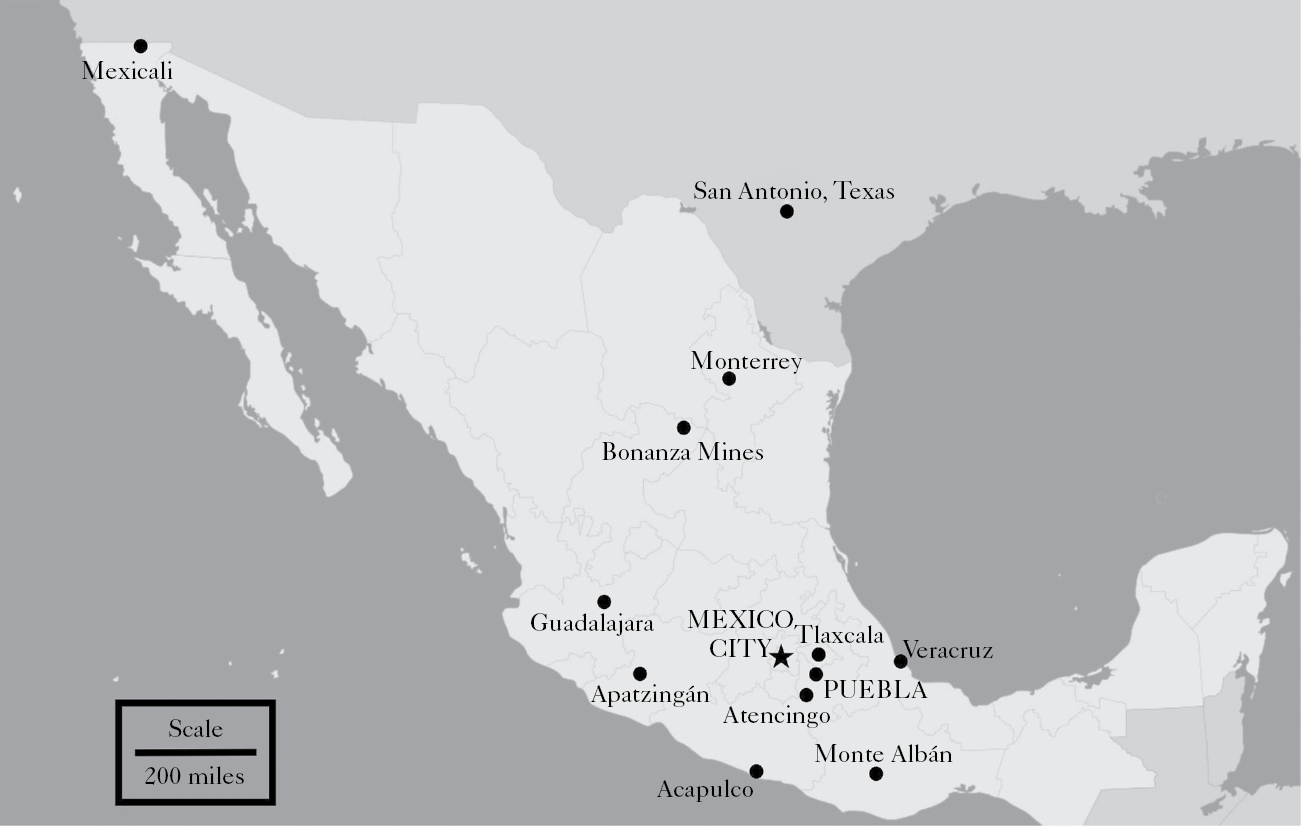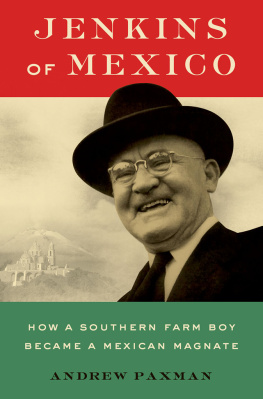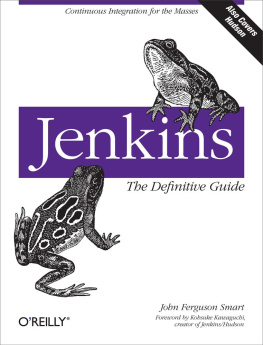Andrew Paxman - Jenkins of Mexico
Here you can read online Andrew Paxman - Jenkins of Mexico full text of the book (entire story) in english for free. Download pdf and epub, get meaning, cover and reviews about this ebook. year: 2017, publisher: OxfordUP, genre: Detective and thriller. Description of the work, (preface) as well as reviews are available. Best literature library LitArk.com created for fans of good reading and offers a wide selection of genres:
Romance novel
Science fiction
Adventure
Detective
Science
History
Home and family
Prose
Art
Politics
Computer
Non-fiction
Religion
Business
Children
Humor
Choose a favorite category and find really read worthwhile books. Enjoy immersion in the world of imagination, feel the emotions of the characters or learn something new for yourself, make an fascinating discovery.
- Book:Jenkins of Mexico
- Author:
- Publisher:OxfordUP
- Genre:
- Year:2017
- Rating:4 / 5
- Favourites:Add to favourites
- Your mark:
- 80
- 1
- 2
- 3
- 4
- 5
Jenkins of Mexico: summary, description and annotation
We offer to read an annotation, description, summary or preface (depends on what the author of the book "Jenkins of Mexico" wrote himself). If you haven't found the necessary information about the book — write in the comments, we will try to find it.
Jenkins of Mexico — read online for free the complete book (whole text) full work
Below is the text of the book, divided by pages. System saving the place of the last page read, allows you to conveniently read the book "Jenkins of Mexico" online for free, without having to search again every time where you left off. Put a bookmark, and you can go to the page where you finished reading at any time.
Font size:
Interval:
Bookmark:


Oxford University Press is a department of the University of Oxford. It furthers the Universitys objective of excellence in research, scholarship, and education by publishing worldwide. Oxford is a registered trade mark of Oxford University Press in the UK and certain other countries.
Published in the United States of America by Oxford University Press
198 Madison Avenue, New York, NY 10016, United States of America.
Oxford University Press 2017
All rights reserved. No part of this publication may be reproduced, stored in a retrieval system, or transmitted, in any form or by any means, without the prior permission in writing of Oxford University Press, or as expressly permitted by law, by license, or under terms agreed with the appropriate reproduction rights organization. Inquiries concerning reproduction outside the scope of the above should be sent to the Rights Department, Oxford University Press, at the address above.
You must not circulate this work in any other form and you must impose this same condition on any acquirer.
Library of Congress Cataloging-in-Publication Data
Names: Paxman, Andrew, 1967 author.
Title: Jenkins of Mexico : how a Southern farm boy became a Mexican magnate / Andrew Paxman.
Description: New York, NY : Oxford University Press, 2017. | Includes bibliographical references and index.
Identifiers: LCCN 2016042218 (print) | LCCN 2017006803 (ebook) |
ISBN 9780190455743 (hardback : acid-free paper) | ISBN 9780190455750 (Updf) |
ISBN 9780190455767 (Epub)
Subjects: LCSH: Jenkins, William O. (William Oscar), 18781963. |
BusinessmenMexicoBiography. | AmericansMexicoBiography. |
PhilanthropistsMexicoBiography. | Puebla de Zaragoza
(Mexico)Biography. | MexicoEconomic conditions20th century. |
MexicoBiography. | TennesseeBiography. | BISAC: BIOGRAPHY & AUTOBIOGRAPHY / Historical. | HISTORY / Latin America / Mexico. |
HISTORY / United States / 20th Century.
Classification: LCC HC132.5.J57 P38 2017 (print) | LCC HC132.5.J57 (ebook) |
DDC 338.092 [B] dc23
LC record available at https://lccn.loc.gov/2016042218

Jenkinss Mexico: Where he lived and where he mainly invested.Yavidaxiu, Mxico, con divisin poltica y sin nombres, https://creativecommons.org/licenses/by-sa/3.0/.
Source: https://commons.wikimedia.org/wiki/Category:Blank_maps_of_Mexico#/media/File:Mexico_blank.svg.
William O. Jenkins, said to be the richest man in Mexico, was an early riser. He worked all morning in the office that shared the immense space of his home: the penthouse above Pueblas leading department store. Though his assets included several hundred movie theaters, substantial rural and urban real estate, various textile mills, and Mexicos second-largest bank, his entire staff consisted of a personal assistant, an accountant, and a secretary. People who came to him for moneya farmer hoping for a loan, a businessman seeking venture capital, a state governor keen for him to finance a schoolall had to climb the four flights of stairs to his rooms. Though now past eighty, he refused to install an elevator, for he was a champion of physical fitness and advancement by merit. He neither smoked nor drank. And he was frugal. On more than one occasion, visitors entered his office to find him peeling an unmarked stamp from an envelope. He would explain: I hate to see anything go to waste.
In the early afternoon he would head outdoors. First he visited the cemetery where his wife lay buried; he had repatriated her body from California, where she had spent her final years. For half an hour he would sit on a stool by her grave. Then to the Alpha Club, for tennis. He preferred doubles, which let him partner with a local ace and usually win. Afterward he might visit his nearby ranch, where he cultivated vegetables, or take in a movie at one of the theaters he owned. Mexican comedies were his favorite; audiences knew him by his booming laugh. In the evening he dined early, together with his cook and his maids.
Weekends often found him out of town. He owned a farm two hours to the south, where he grew melon and cane. He held cotton land on the US border, and he had begun buying land in the west, to develop a second cotton estate. The old man was seldom happier than when tramping around fields, giving directions; doing so reminded him of his boyhood, on farms in Tennessee. In the passport of this titan of industry, the entry for Occupation still read, Farmer. Another pleasure was to gather friends and relatives and fly to Acapulco in his secondhand airplane. He owned a hilltop mansion there, furnished with plastic chairs and an unheated swimming pool.
The casual observer might have viewed this elderly man as scarcely more than dour and unorthodox, his thrift and disregard for class distinctions quite out of step with the Mexican elite. Yet partly because he was so very rich and partly because he was so very American, he was the countrys most hated capitalist. And in 1960, the clamor against Jenkins was at a peak.
Mexico, like its northern neighbor, was facing a crossroads. Fifteen years of postwar conservatism met the choice of a liberal turn. The nation had recently gained a president in his forties, and the United States was about to elect one too; both were men of charisma and energy, keen to travel to foster alliances. Most urgently, John Fitzgerald Kennedy and Adolfo Lpez Mateos shared the Cold War challenge of Cuba: How should they respond to a socialist regime, less than a hundred miles from the shores of both countries? With confrontation, neutrality, or accommodation? The key difference was that, for the United States, the question was one of foreign policy, with consequences for relations with Russia, hemispheric leadership, and global security. For Mexico, the matter resounded at home.
Mexicos rulers styled themselves the Institutional Revolutionary Party (PRI in Spanish), the perennial keepers of a flame ignited in 1910,
Mexicos debate over Cuba was a questioning of its own identity. Since 1938, when President Lzaro Crdenas had pushed socialism to popular heights by seizing the oil sector from US and British firms, the PRI had retreated from the Revolutions promises. Hammered out in a new constitution, those promises had sought to banish the injustices of the dictatorship of Porfirio Daz (18761911), when foreigners dominated the economy and white landowners gobbled up the fields of indigenous villages. Now, some of those Porfirian imbalances were returning. Despite a pledge of effective suffrage, elections at every level were won by the PRI. Despite an agrarian policy that partitioned haciendas among the poor, new estates were emerging. During a twenty-year economic miracle, wealth had largely failed to trickle down; the 1960 census showed more than a third of Mexicans to be shoeless and illiterate and half to be living in single-room homes. In spite of a promise of Mexico for the Mexicans and decades of protectionism, foreign investors were reclaiming much of the market.
To many on the left, no one better epitomized what had gone wrong than Seor Jenkins. Crdenas described him as a relic of the past: a large-scale landowner, monopolist, and foreign capitalist; in the language of the left, capitalist meant exploiter.
Font size:
Interval:
Bookmark:
Similar books «Jenkins of Mexico»
Look at similar books to Jenkins of Mexico. We have selected literature similar in name and meaning in the hope of providing readers with more options to find new, interesting, not yet read works.
Discussion, reviews of the book Jenkins of Mexico and just readers' own opinions. Leave your comments, write what you think about the work, its meaning or the main characters. Specify what exactly you liked and what you didn't like, and why you think so.











